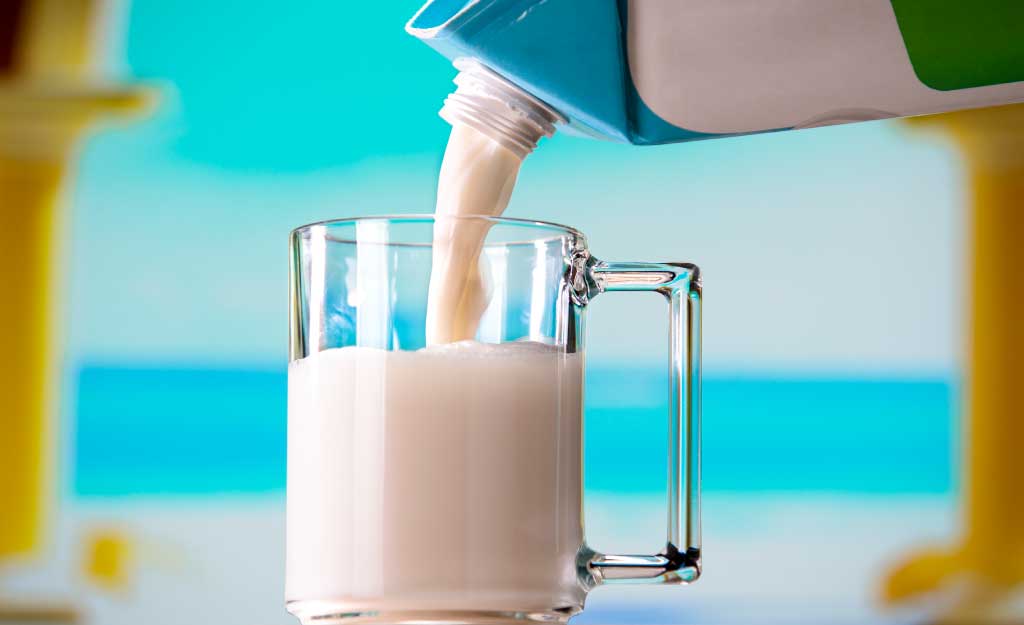Coconut milk is an essential ingredient in various Southeast and South Asian countries. However, it’s available in both a carton and a can. So, is there a difference between the two?
The most fundamental difference between coconut milk in a carton and a can is its consistency due to the difference in water content. Carton coconut milk is a considerably watered-down version of its canned counterpart. While boxed coconut milk can be used as a non-dairy alternative, canned coconut milk is better utilized for cooking.
Keep reading to find out if there are any more differences between the two products and whether they can be used interchangeably.
5 Differences Between Canned and Carton Coconut Milk
Apart from the consistency, there are other differences between the canned and carton coconut milk. Let’s look at all of them so that you can pick the suitable variant on your next grocery trip.
1. Water Content
The most significant difference between canned and boxed coconut milk is that the latter is much more dilute than the former—this difference in the consistency results in a change in taste. Thus, while carton coconut milk is made from coconut and water just like the canned version, canned coconut milk has a much more nuanced flavor of the typical coconut-y sweetness and creaminess.
For comparison, one cup of organic unsweetened carton coconut milk from So Delicious has 4.5g of total fat, whereas there is 12g of fat in 1/3 cup of canned coconut milk from Thai Kitchen. This roughly translates to 800% less fat in carton coconut milk, all due to extra water.
2. Ingredients
One glance at the ingredients of both the coconut milk versions makes it clear that the canned version is much more authentic, with little to no additives or stabilizers. In contrast, the carton of coconut milk has a long list of ingredients apart from coconut and water, which (depending on the brand) include synthetic vitamins and minerals, as well as added flavorings under the “Natural Flavors” label, which companies do not have to disclose the nature of, and stabilizers.
In contrast, the canned version mainly has water and coconut, with usually the inclusion of organic guar gum. Now, guar gum is also a stabilizer and thickener like the one used in the carton version. Still, the absence of any flavoring or synthetic ingredients makes canned coconut milk taste much closer to the authentic flavor of the fruit.
3. Price Point
Understandably, since carton coconut milk is quite watered down, it is much cheaper than its canned alternative. Canned coconut milk has more fruit and fat content than the boxed version can be poured from the box, just as you would with milk.
4. Uses
Despite both canned and carton coconut milk being made from the same fruit, they usually cannot be used interchangeably in recipes. Carton coconut milk can be a non-dairy alternative for milk that you can drink on its own, use in cereals, make smoothies, or whiten your coffee. Moreover, its consistency makes it suitable for replacing dairy milk in cooking and baking.
However, in curry recipes, canned coconut milk is required to add richness and creaminess. Switching the canned version with the carton will result in a watery curry with neutral. While you can use the carton of coconut milk to adjust the consistency of the curry, it lacks the depth of flavor needed as the base of the curry and several other savory dishes.
5. Packaging
The packing difference between the two products is noticeable even to the naked eye. In fact, their packaging style is what is used to refer to them: canned and carton. However, one concern with canned coconut milk is the usage of BPA in the packaging, which has been linked with various health issues, even when consumed in small amounts. Luckily, many brands have ditched BPA use in packaging, but it is always prudent to look for the BPA-free label.
Despite limited information about chemicals (if any) in the carton packaging, it is considered BPA-free, a much safer and cost-effective option.
Where Can You Find Coconut Milk In a Grocery Store?
Fresh Coconut milk in the carton is usually found in the refrigerated section next to dairy-free milk options like almond and cashew milk. You can find canned and non-refrigerated cartons of coconut milk in the Asian aisle of any grocery store. If your local store does not have a dedicated Asian aisle, you can look for the same in the international section.
How To Store Coconut Milk
Carton coconut milk should be stored in the fridge after it’s opened and used within seven to ten days. Ensure the expiration date and use the milk within the time frame.
You can store unopened canned coconut milk in a cool dark place for several months. However, after it’s been opened, transfer the contents to an airtight container. Then, place the container in the fridge to consume within five days.
You can also freeze opened canned concur milk by freezing individual portions in either ice trays or sealable plastic bags. However, once thawed, the coconut milk will become less flavorful. It also usually loses its original texture and becomes grainy. Frozen coconut milk will last around three months. Although, it is prudent to give the thawed liquid a quick sniff and discard it if it doesn’t look or smell right.
Can You Make Coconut Milk At Home?
You can make coconut milk at home by blending shredded coconut and water. You can also add salt or any other flavoring as per your choice. Once thoroughly blended. You can pass the mixture through a nut milk bag or an old, clean, light t-shirt. Your coconut milk is ready.
5 Coconut Milk Substitutes
In case you cannot find coconut milk at your local grocery store, you can use the following products in its place.
1. Coconut Powder
Mixing coconut powder with water can replicate the flavor of coconut milk. Plus, it lasts a long time, and you can control the thickness of the mixture.
2. Heavy Cream
While heavy cream lacks the coconut flavor, it does have the same thick consistency as the canned version.
3. Non-Dairy Milk Alternative
Non-dairy milk alternatives like almond milk, soy milk, and cashew milk prove to be excellent replacements for coconut milk. Just ensure the fat content in each such substitute and add to recipes as required. For example, cashew milk is good for curries, whereas almond milk is good for smoothies and baking.
4. Greek Yogurt
Greek coconut provides the same richness to recipes as coconut milk, and it can be bought in coconut flavor.
5. Evaporated Milk
The creamy texture of evaporated milk makes it a good coconut milk substitute.
Final Words
Carton coconut milk is a much more watered-down version of canned coconut milk. Moreover, the boxed version has various stabilizers and additives, making it less authentic in flavor than its alternative version.

